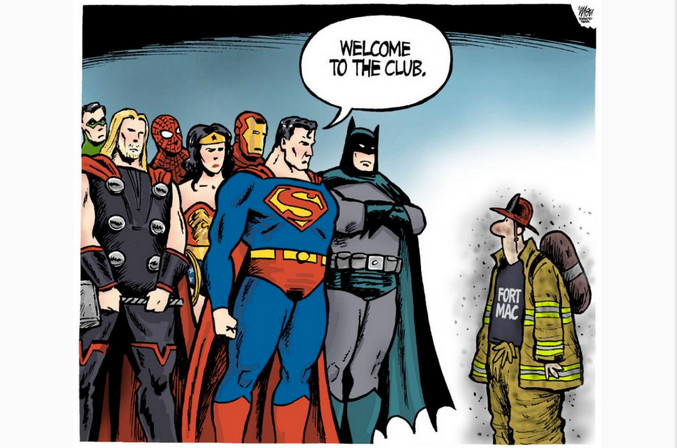
From the Floor
Jay Shaw
Features BlogsMay 11, 2016, Winnipeg - The Toronto Star published an editorial cartoon yesterday of a group of superheroes standing together in solidarity in front of a Fort McMurray firefighter – Superman, Batman, and other comic-book icons looking stoic and in appreciation of a humble firefighter who was covered in soot from protecting his community; the image has appeared all over social media.
The caption reads simply “Welcome to the club.” The cartoon pays respect to the heroic actions of Alberta fire-service members and particularly those firefighters who went to battle while they were losing their own homes. But like nails to a chalkboard, many of us have a big problem with the word hero. What is a hero? And why do responders who get paid to a do a job qualify for such a title? Firefighters are, first, humans with insecurities, strength and weaknesses, and we, for sure, do not harness powers that classify us a superheroes; it just isn’t a club that we should be part of. We bleed, face emotional trauma and, sometimes, we die in the line of duty. Superheroes don’t die, and in our reality we know we could.
 |
|
|
|
I’m not sure I will ever be able to fully articulate the conflict I have with the word hero; it just rings hollow and feels like a heavy, uncomfortable coat. Responders understand this, and we also understand the images and the videos we’ve all seen demonstrating heroic actions, but what we do is not the work of heroes.
In context, the actions of thousands of responders in Fort McMurray classify as the perfect definition of what a hero is; however, that said, not one will allow the tag hero to be pinned on his or her chest without some level of uneasiness. This is a good thing, because responders know that the privilege to serve in an adverse or risky situation is all about the team, the community and the greater good. No one firefighter makes the save alone, or acts without the support of many.
I’ve seen at least two videos of reporters putting the hero tag on Fort Mac firefighters, and those guys shrugged it off, put it back to the community and their teammates, and then choked on their emotions as they tried to stay on point. I get the fact that the news media wants stories of the healing process, and recovery needs inspirational stories to move us ahead and get closure; but those guys didn’t want to wear the coat, they wanted to express something else, something more raw. I could see it in their eyes and I knew I needed to take a shot at defining what it was.
Firefighters are not heroes, yet every single one of those Alberta firefighters in Fort Mac qualifies; this is why this is so difficult and confusing to define. In fact, I will go on the record and state paid or volunteer responders of any skill set rarely ever should qualify for the term, but yet I will swear on a stack of bibles I’ve seen the work of heroes with my own two eyes. I have witnessed skilled paramedics steal death away from their patients, firefighters perform rescues that to this day get my emotions going, and of course the cops in Winnipeg put their lives on the line in this city every second they wear that badge. But hero, or being called one – it just isn’t what this job is about, or what I would call these men and women. So what is a hero?
Heroes to me are the spouses of the responders who put up with our crap and let us live in this crazy world in which we take risks and put strangers ahead of our own families at times when we have to. Heroes are the Fort McMurray residents who lived our motto in the worst of times, “leaving no one behind” as they assisted each other under conditions and images that frankly, I just can’t fathom. Heroes are the kids who cracked open their piggy banks for the Red Cross, started lemonade stands and donated their toys because their parents raised them to be empathetic and caring. Heroes are the sandwich makers in the church basements, the cookie bakers and the well-wishers who motivate the firefighters to never quit and never give up. Heroes are people we work for and serve because they represent our communities and our cities.
The work of a hero is silent, it is humble and unassuming. Heroes do the work because it’s the right thing to do, not because there is a prize or reward at the end. Heroes are untrained and unqualified to understand and take the risk, and they do it anyway. The people of Fort Mac are heroes, and have used their actions, kindness, and willpower to fuel and motivate the efforts of the responders who have given so much. Firefighters are merely the defenders of a community, servants who abide by a code to protect life and property, and we are privileged to have the ability to do what we love. The actions of firefighters have been heroic but the people of Fort McMurray are what heroes truly are. I think this is what the firefighter in the comic was trying to say to Superman. And I know for damn sure the firefighters of Fort McMurray would do it all over again because it is an absolute honour to serve their citizens.
Jay Shaw is a firefighter and primary-care paramedic with the City of Winnipeg. Along with multiple fire and emergency-services courses and certificates, Jay holds a masters degree in disaster and emergeny management from Royal Roads University and is an independent education and training consultant focusing on leadership, management, emergency preparedness and communication skills. Contact him at jayshaw@mts.net and follow him on Twiter @firecollege
Print this page